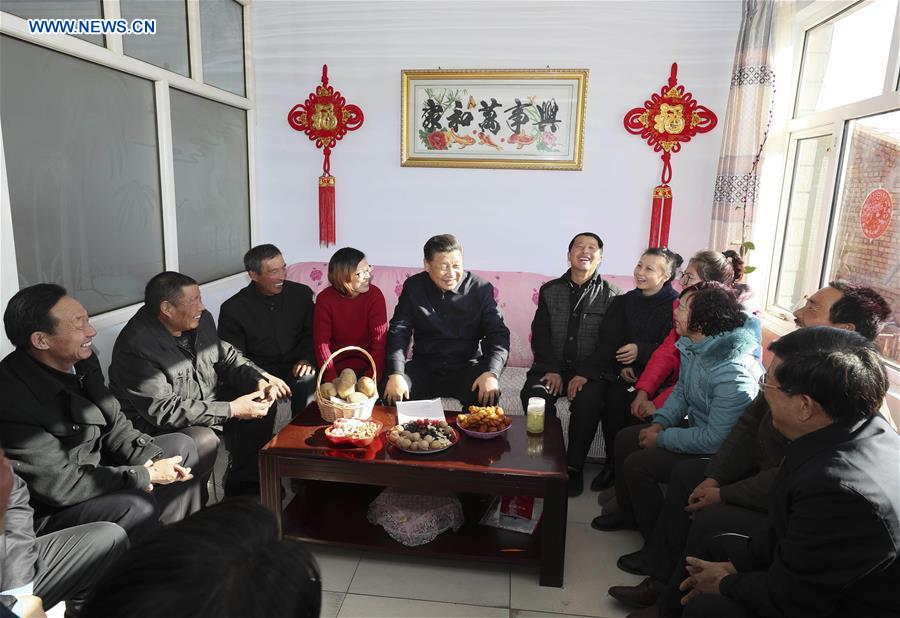Xi’s new year inspection indicates poverty relief
As most Chinese are busy preparing for Spring Festival, China’s top leader this week was in the snow-covered grassland of northern China, facing the country’s arch enemy.
|
|
| Chinese President Xi Jinping talks with villagers and local cadre at the home of villager Xu Haicheng in Desheng Village, Xiaoertai Township of Zhangbei County in north China’s Hebei Province, on Jan. 24, 2017. Xi Tuesday pushed for increased efforts on poverty alleviation during an inspection tour to the city of Zhangjiakou. (Xinhua/Lan Hongguang) |
For the fifth year in a row, Xi Jinping’s New Year inspection tour had taken him to the front lines of China’s war against poverty.
This time, the battleground was Desheng, a small village in Zhangbei County, Hebei Province.
Left out of China’s headlong rush to riches following decades of economic reform, Zhangbei — just 200 kilometers north of Beijing — has been classed as a deprived county since 2013, with one eighth of its population still living on less than one dollar a day by October last year.
Fighting poverty is the fundamental task in building an all-round moderately prosperous society,” Xi told villagers in Desheng days ahead of the traditional Chinese New Year.
China is striving to become “Xiaokang,” or a moderately prosperous society in an all-round way, by 2020, just before the centennial anniversary of the founding of the ruling Communist Party of China (CPC).
One aim is to make sure that those yet to be lifted out of poverty, about 45 million by 2016 year-end, could take their rightful place as citizens of a well-off society with the rest of the nation.
In Xi’s own words, “no one should be left behind.
Though Xi’s words hardly deviated from what had been said on previous occasions, the timing nonetheless gave them a little extra weight.
Chinese leaders have made it a tradition to visit ordinary people in both urban and rural areas ahead of Spring Festival.
Xi himself visited Gansu Province and Beijing in early 2013, north China’s Inner Mongolia Autonomous Region in 2014, northwest China’s Shaanxi Province in 2015, and east China’s Jiangxi Province in 2016.
Most of the places he has visited during the festive seasons have been locked in a relative development backwater.
Xie Chuntao, a professor from the Party School of the CPC Central Committee, said Xi’s new year visits underscored the current leadership’s greater commitments to achieving “Xiaokang.”
His words were echoed by Xu Yaotong from the Chinese Academy of Governance.
“Xi is first and foremost concerned with ‘Xiaokang’ of all Chinese people,” said Xu.
In addition to inspection tours, Xi has raised poverty alleviation with national lawmakers during the annual March sessions of the top legislature.
The country’s 13th Five-Year Plan, which outlines priorities for national development from 2016 to 2020, also proposes support for poor villages to develop signature products and services.
In early December, guidelines were issued calling for enhanced collaboration between developed eastern regions and under-developed western regions to bridge the regional development gap and meet 2020 poverty-reduction targets.
Already, all these efforts have been translated into encouraging signs of achievements. China had seen its rural population living in poverty decrease from 770 million to 55.75 million between 1978 and 2015.
An additional 10 million people shook off poverty last year, and China is aiming to help at least another 10 million become members of the well-off society this year.
In Zhangbei alone, 20,700 of its 372,000 residents were lifted out of poverty in 2016. Thanks to a major poverty-alleviation program, the county is receiving support, including measures to promote profitable agricultural products and emerging industries such as solar power.
But as Xi himself admitted in Hebei this week, “poverty alleviation is getting more and more difficult as it progresses to the end,” Xi said.
Nonetheless, he insisted that local Party and government authorities must make sure that all must be lifted out of poverty “in time.”
He stressed the importance of making sure every poor family had a program for increasing their income and every poor person had a way of casting off poverty.
The president pointed to relocation as an important supplementary approach when fighting poverty and highlighted the role of ecological compensation, which would not only help improve the ecological environment but also boost incomes.
Stressing the importance of education in poverty alleviation, Xi said, “Making sure children of impoverished families enjoy access to high-quality education is a fundamental solution to poverty.”
Xie Chuntao agreed. “If we compare China’s development to a wooden bucket, the amount of water a bucket can hold is determined by its shortest plank,” Xie said, adding that poverty is one of the short planks.
“President Xi has just spelt out the way to fix those short planks,” he said.
China vows to get tough with duty-related crimes
The Supreme People’s Procuratorate (SPP) will strengthen prosecution of duty-related crimes and maintain the momentum of the crackdown on corruption in 2017, an official said.
Chen Guoqing, head of the public prosecution division of the SPP, said that the SPP will improve prosecution procedures and handle cases of duty-related crimes with higher standard and efficiency.
The SPP will take part in the campaign of locating officials who have fled overseas and recovering their ill-gotten gains, Chen said.
The SPP will continue to reform the trial-centered litigation system and improve the leniency system for those who confess to their crimes, Chen said.
Procuratorates at all levels have been urged to follow instructions by the SPP and perform their duty based on advanced science and technology, Chen added.
China to improve geological disaster prevention in Xinjiang
China will invest 50 million yuan (7.3 million U.S. dollars) over the next three years to improve geological disaster prevention in Xinjiang Uygur Autonomous Region.
This year, the region, in northwest China, will be the subject of a comprehensive geological survey in five counties including Yecheng, Uqar and Shache in its south and west, said Wei Wenhui, head of the regional geological environment monitoring institute.
Geological disaster prevention networks will be built in the five counties to avoid casualties and property losses, said Wei.
About 60 percent of the region’s total land is prone to disasters. Last year, the region suffered 65 geological disasters, causing direct economic losses of 290 million yuan.
On July 6, 2016, a landslide in a village in Yecheng killed 35 people. The residents have since been relocated.
Problems in eastern Europe
One of the most disappointing things about the high strategy of the EU has been its approach to Eastern Europe. Today there remain substantial problems on the eastern frontier of the Union.
In Turkey the President is seeking referendum endorsement for more centralised power. The President wants more control over the appointment of Judges, the ending of the office of Prime Minister and general rights to run the country as he sees fit. The EU clashed with the President over the recent coup attempt and they have been critical of his record on human rights. It looks as if after years of offering Turkey the prospect of membership of the EU, Germany and the others are cooling on the idea. Last year’s promise of accelerated progress in achieving Turkish accession has been replaced by a distinct distancing. Instead of it being possible to get over the obstacles, EU sources seem more inclined now to play up the difficulties in the way of membership.
On the one hand Mrs Merkel and some of the other leaders seeking re election at home may find it convenient to distance themselves from their previous decision to speed up Turkish membership. On the other hand they face a big problem anyway, thanks to the EU/Turkey Association Agreement. This creates freer movement of people from Turkey into the Schengen area of the EU. The Turks are becoming unhappy about the lack of EU support for them in their task as acting host to more than 3 million refugees from the Middle East. Were they to encourage many of those people to head westwards into the EU Mrs Merkel would have a major problem on her hands.
In Serbia the EU has also been negotiating possible membership. Last week Serbia was to initiate a new train service into Kosovo, which had emerged from the various talks with the EU over how there could be some rapprochement between Serbia and Kosovo after their separation in 2008. The decision of the Serbian authorities to implement this idea with a train that had painted prominently down its sides the message ” Kosovo belongs to Serbia” led to a furious exchange with Kosovo. Serbia had to accept the train would not be allowed over the frontier. Clinton and Blair are remembered fondly in Kosovo for assistance in their struggle with Serbia. What is the EU going to do about the tensions that have flared again between these two?
We have often discussed the EU’s approach to Ukraine and their role in the run up to the illegal annexation of Crimea by a Russia which both saw an opportunity and felt a threat to its naval presence in Crimea. There are no signs of any resolution of this dispute either.
The EU has to be careful not to overstretch. Its long and weak eastern frontier is the source of instability, at a time when the western countries are wanting to turn their backs on migrant flows and the problems of the Middle East for electoral reasons.

